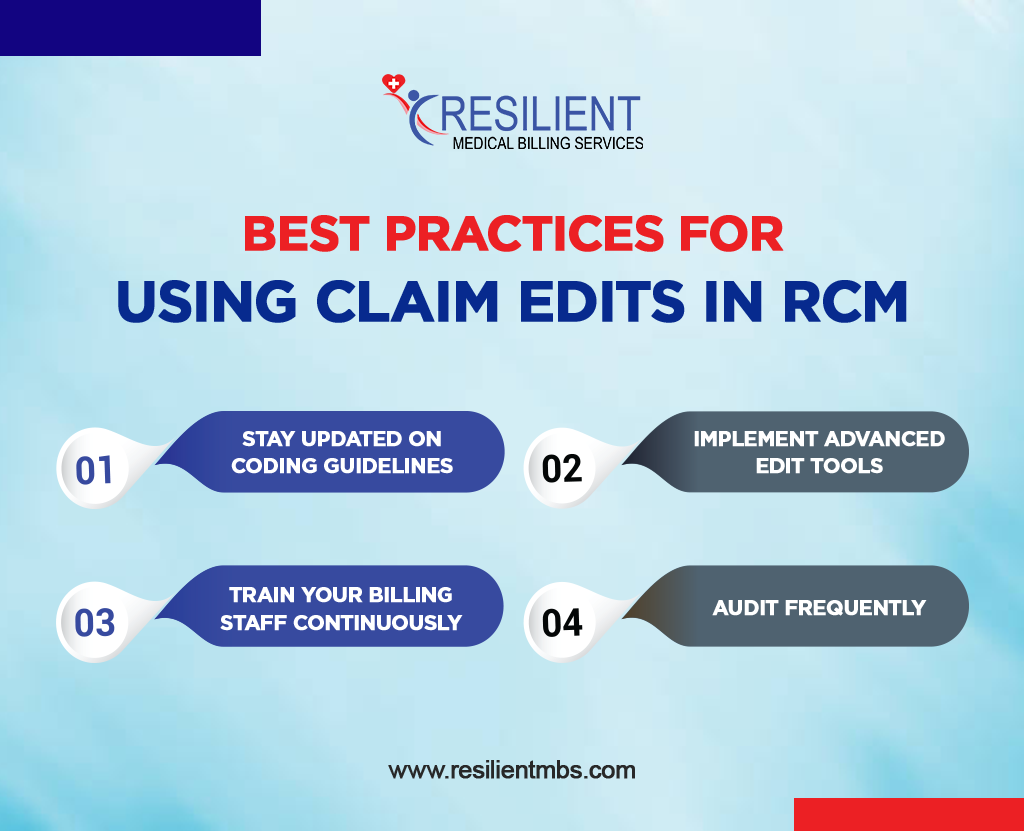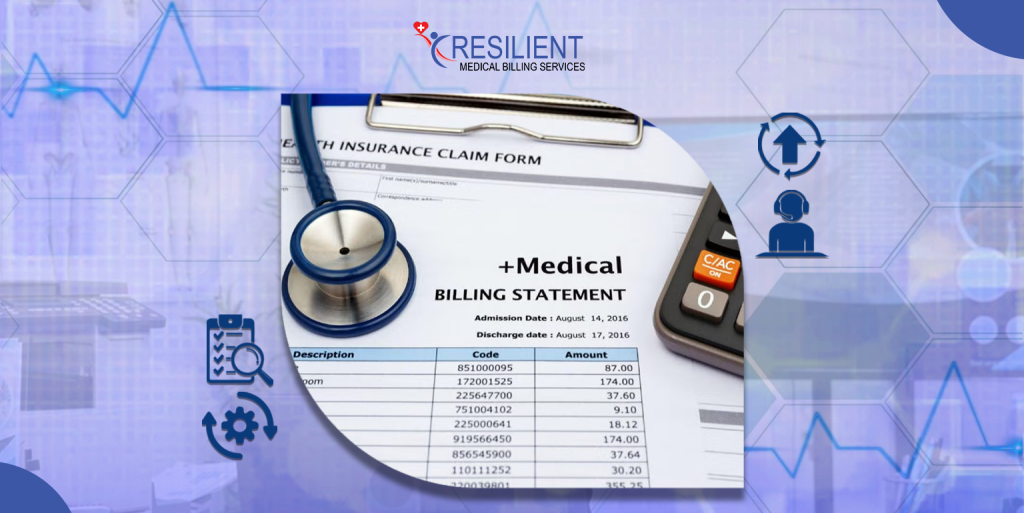Even a tiny error in a medical claim can cause delays, denials, or major revenue loss. In healthcare billing, precision isn’t optional; it’s essential. Every CPT, ICD-10, or HCPCS code must align with payer guidelines to ensure smooth claim processing and timely reimbursement.
That’s where claim edits in medical billing play a crucial role. These automated checks act like quality gates, scanning claims for accuracy and compliance before they reach payers. By identifying and correcting issues upfront, claim edits reduce denials, shorten payment cycles, and protect your revenue stream.
Partnering with Resilient MBS, a trusted medical billing company, ensures your claims pass every edit layer efficiently, so you get paid faster and stay compliant.
Understanding Claim Edits in Medical Billing
In simple terms, claim edits are automated or manual checkpoints built into your billing software to verify the accuracy, completeness, and compliance of each claim.
Their job is to flag:
- Missing or invalid patient/insurance information
- Incomplete diagnosis or procedure codes
- Violations of payer or coding guidelines
Within Revenue Cycle Management (RCM), claim edits are the first line of defense against denials. They keep cash flow steady, reduce administrative rework, and ensure claims meet payer-specific and regulatory requirements.
Types of Claim Edits in Medical Billing
1. Front-End Edits
These occur before a claim is submitted. Front-end edits verify patient demographics, insurance eligibility, and data entry accuracy. They catch missing fields, invalid ID numbers, or incorrect modifiers, ensuring only clean claims move forward.
2. Back-End Edits
Executed after submission, these edits are performed by payers. They validate code combinations, coverage criteria, and service necessity. Back-end edits identify issues overlooked during internal review, helping reduce post-submission denials.
3. Automated vs. Manual Edits
- Automated edits leverage software or AI to instantly detect inconsistencies or incorrect coding.
- Manual edits are handled by trained billing specialists who analyze complex or unusual claim scenarios.
Using both ensures optimal claim accuracy and minimizes human error.
Medicare NCCI Edits and the National Correct Coding Initiative
The National Correct Coding Initiative (NCCI), established by CMS, enforces billing accuracy and prevents duplicate or overlapping claims.
Understanding Medicare NCCI Edits
These rules check that healthcare providers bill procedures correctly under Medicare guidelines. They prevent overpayments by ensuring only legitimate code combinations are used.
Two Major NCCI Edit Categories
- Procedure-to-Procedure (PTP) Edits: Stop services from being billed together when one is part of another.
- Medically Unlikely Edits (MUEs): Limit how many times a service can be billed for a patient in one day.
Examples:
- Billing a surgical procedure and its follow-up care separately when bundled together.
- Reporting diagnostic and therapeutic services for the same body site incorrectly.
- Claiming multiple injections beyond the allowed limits.
Adhering to Medicare NCCI edits keeps claims compliant, accurate, and payable without delays.
Why Claim Edits Matter in Medical Billing
Why Claim Edits Matter goes beyond error detection; it’s about financial protection. Claim edits ensure that data integrity, coding accuracy, and payer compliance align perfectly before submission.
Automated claim edits can reduce denials by up to 25%, directly improving reimbursement rates and minimizing manual corrections. They also enhance payer trust by ensuring every claim adheres to standardized billing protocols.
In short, claim edits in RCM are vital for operational efficiency, compliance, and sustainable cash flow.
Partner with Resilient MBS for smarter claim edit solutions that keep your billing accurate, compliant, and profitable. Our expert team applies advanced automation and data-driven RCM strategies to reduce denials and accelerate reimbursements.
Smart Claim Edits: Preventing Denials and Boosting Efficiency
Modern healthcare billing demands smarter solutions. AI-driven claim edits now use predictive algorithms to detect errors in real time, long before submission.
Smart edits review every data field, comparing it against payer rules, NCCI edits, and historical claim trends. This proactive approach prevents common mistakes like duplicate codes, missing modifiers, or incompatible procedures.
Key Benefits of Smart Claim Edits:
- Fewer denials and resubmissions
- Shorter payment turnaround times
- Enhanced billing team productivity
- Greater payer compliance
By leveraging automation and machine learning, providers achieve cleaner claims, faster reimbursements, and stronger financial performance.
Best Practices for Using Claim Edits in RCM
To maximize the impact of claim edits:

- Stay Updated on Coding Guidelines
Regularly refresh CPT, ICD-10, and HCPCS code sets and review payer-specific policies. - Implement Advanced Edit Tools
Integrate claim edit software within your EHR or billing system for automated detection and correction. - Train Your Billing Staff Continuously
Conduct workshops on the national correct coding initiative edits and claim-review best practices. - Audit Frequently
Routine claim audits identify recurring errors and ensure compliance across all payers.
These steps enhance RCM accuracy, prevent financial leakage, and streamline your billing workflow.
Wrap-Up
Claim edits form the backbone of an efficient billing system. They detect issues early, protect revenue integrity, and ensure seamless payer compliance.
In 2025 and beyond, AI-powered claim edits are transforming medical billing by combining automation, accuracy, and analytics. Providers using these tools experience faster payments, lower denial rates, and improved cash flow stability.
Contact Resilient MBS today for a free billing audit and discover how to protect your revenue through smarter claim management.
FAQs
What are claim edits in medical billing?
Claim edits are automated checks that validate codes, patient details, and charges before claim submission to prevent denials and ensure payment accuracy.
What are the main types of claim edits in medical billing?
Front-end edits check claims before submission, back-end edits occur after submission, and NCCI edits prevent duplicate or incompatible coding.
What are Medicare NCCI edits?
They are CMS-developed rules preventing improper billing by restricting invalid code combinations, keeping claims compliant and accurate.
Why are claim edits important?
They reduce denials, save time, and improve overall reimbursement efficiency, ensuring financial stability for healthcare practices.
How do smart claim edits prevent denials?
Smart edits powered by AI analyze claim data in real time, identify inconsistencies, and alert billers before submission to avoid payer rejections.










